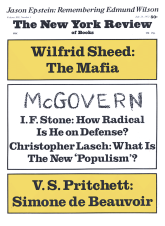In response to:
The Press: Freedom From, as well as Of from the June 29, 1972 issue
To the Editors:
Although most of Robert Craft’s diatribe against me in his article of June 29 revolved about my presumed inadequacies as the writer of Stravinsky’s obituary, I did not, in simple fact, write it. More than a year has gone by since the obituary was published, and in that time Mr. Craft might have been able to discover (by a phone call, for instance) that I was not even on the New York Times staff when it was composed. The obituary was unsigned, as many such articles are, because the writer of it had left the Times when it was printed. I did indeed write a news report of the death, which accompanied the obituary but was not related to it in any other way.
If Mr. Craft is going to enter the field of musical journalism, he will have to do better than this.
Donal Henahan
New York City
Robert Craft replies:
Mr. Henahan obligingly adds to my documentation of his incompetence. First, the part of the obituary that he claims was written before his own stretch of Times-serving mentions an event in November 1969. At that date—as a phone call has confirmed—he was on the newspaper’s staff. (He had also “interviewed” the Stravinskys on the Times’s behalf six months before that.) Second, his calculation that “most” of my “diatribe” against him is concerned with this part of the obituary, reduces, on actual count, to a dozen lines out of three hundred and sixty.
I would assume that the Times began compiling Stravinsky’s obituary as long ago as his emergence into international eminence, c. 1913, periodically revising and updating it thereafter. For this reason I concentrated my illustrations of Henahan’s “inadequacies” not on the Times obituary but on his “news” part of the story. But thanks to Ms. Libman, Stravinsky’s self-styled “personal manager”—preposterous appellation in connection with such a man!—the Times was informed of his death seconds after it happened. Mr. Henahan had the entire day, therefore, from 5:20 AM of April 6 until the first edition of April 7, to check the obituary’s pre-fabbed parts. If he did not do so, he should have, and if he did do so, he ought to have corrected them. After all, as a member of the paper’s music department, and having attached his name at the head of the front page portion of the story, he should have taken some responsibility for the whole—the most important obituary of a musician the Times is ever likely to publish.
This Issue
July 20, 1972



